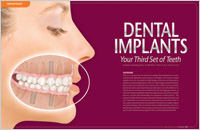
Dental Implants — Toronto, Ontario
Rebuild Missing Teeth from the Roots Up

More than 42% of people above the age of 65 are missing all of their teeth in one or both jaws. Most of these teeth were lost to gum disease. Research shows that 85% of the estimated 32 million people with dentures in the US and Canada experience pain, embarrassment and difficulty with their false teeth. Now patients who have lost more than one tooth in a row may have a better choice than a fixed bridge, removable partial or full denture.
Why Choose Dr. Kevin Dann of Dentistry Asleep For Dental Implants?
- #1 Dental Implant Treatment Completed by Highly Experienced Dentist & Team
- #2 Certified Specialist in Dental Anaethesia for Comfortable Treatment
- #3 Permanently Replace Any Number of Missing Teeth
What Are Dental Implants?

Although implantation of artificial or replacement roots has been attempted for hundreds of years, only recently have techniques been worked out that makes them predictably successful. Modern dental implant techniques and technologies originated in Sweden in the early 1960's. After scientifically proving that these new bone-integrating titanium implants were successful, Swedish researchers brought their methods to a few select centres in North America in 1981.
Toronto was one of these original, chosen study centres. Dr. Dann was fortunate to be one of the few dentists selected to work with dental implant patients in the early 1980's. This unique experience gives him a longer history than most in this field and an opportunity to see and experience many changes and advancement in the field of implant dentistry.
The 4 Step Dental Implant Process

Unlike some other treatments that can be performed on the day of your appointment, dental implants require several steps to implement. These can stretch on for a few months, but this lengthy period is necessary to ensure that your new smile stands the test of time.
If you’re considering dental implants at Dentistry Asleep, knowing what to expect from the process can help you be prepared to commit to the treatment. So, continue reading to learn about each step and how, together, they create a sturdy and functional dental implant.
Initial Dental Implant Consultation

The initial dental implant consultation is a crucial first step in the implant process. During this visit, Dr. Dann will conduct a thorough examination of your mouth, taking X-rays to assess your jawbone health. This is one of the most important factors to determine if you’re a suitable candidate for implants. You’ll also discuss your dental history, overall health, and your specific needs and expectations. Dr. Dann will explain the procedure in detail, including the timeline, costs, and any preparatory treatments required. Your consultation needs to be thorough to make the rest of your personalized treatment go as smoothly as possible.
Dental Implant Surgery

Dental implant surgery is the next step after your consultation. Performed under local anesthesia, the procedure begins with Dr. Dann making a small incision in the gum to expose the jawbone. A precise hole is then made into the bone, and a titanium implant post is carefully inserted and topped with a healing cap. The gum is then closed over the implant. This fixture will serve as an artificial tooth root that will later hold your restoration in place. This minimally invasive surgery causes only minor discomfort, which can be managed with over-the-counter pain relievers.
Dental Implant Osseointegration & Abutment Placement

After the implant post is placed, a process called osseointegration begins. Over the next few months, the titanium post will fuse with the surrounding bone tissue, creating a solid and stable base for your future artificial tooth. This integration period is critical for the success and longevity of the implant. Once osseointegration is complete, Dr. Dann will perform another minor surgical procedure to attach an abutment to the implant. This piece serves as a connector between the implant and your restoration. Once the abutment is placed, the hard part is over! Soon, you’ll be in the final phase of your treatment.
Delivery of Dental Implant Restoration

The final step in the dental implant process is the delivery of your dental implant restoration. Dr. Dann will take impressions of your mouth to create a custom crown, bridge, or denture that matches the color, shape, and size of your natural teeth. It will take a couple of weeks, but once your restoration is ready, it will be securely attached to the abutment. Dr. Dann will then ensure the fit is perfect and make any necessary adjustments. The result is a natural-looking and fully functional tooth that blends seamlessly with your smile, allowing you to eat, speak, and beam with confidence.
Benefits of Dental Implants

If you have one or more missing teeth, the quality of your daily life can suffer. Tasks that were once second nature like eating, speaking, and smiling suddenly become much more challenging. Thankfully, Dr. Dann can rebuild your grin with dental implants. These artificial teeth are often touted as the ideal replacements for good reasons. They’re the only restorations that are surgically embedded into your jawbone which means they have some unique advantages over alternatives like dental bridges or dentures.
Continue reading below to learn more about how you might benefit from dental implants and feel free to contact our friendly team if you would like more information.
Day-to-Day Benefits

An estimated 3 million people in the United States have dental implants and that number is expected to grow in the coming years. Part of the reason they’re so popular is that they can greatly enhance your day-to-day routine because they:
- Restore your ability to chew. There are very few dietary restrictions that come with these artificial teeth because they’re firmly anchored in place. That means you can enjoy all your favorite meals like you used to.
- Allow for proper enunciation. You can develop a lisp or other speech issues if you have gaps in your grin, but once they’re filled, you’re sure to be clearly understood.
- Upgrade your appearance. Worrying about how others will perceive you can leave you feeling anxious or depressed, but dental implants look and feel natural so no one will know the difference.
- Are easy to clean. Maintaining them is as simple as brushing and flossing twice daily.
Health Benefits

Tooth loss can be seriously detrimental to your oral health, but dental implants can prevent problems by:
- Preserving your facial structure. Your jawbone begins to deteriorate when teeth go missing but your restoration functions like the root of a tooth. Every time you bite down it stimulates your jaw to keep it active to maintain the shape of your face.
- Preventing drifting. Your remaining teeth are prone to shifting out of place to fill in the gaps left behind. If they’re not properly aligned, they can sustain uneven wear and tear that leaves them more vulnerable to injury.
- Avoiding oral issues. Because brushing and flossing them is convenient, you’re less likely to develop cavities or gum disease.
Long-Term Benefits

Dental implants are a great way to improve your daily life as well as your dental well-being. On top of that, they also provide several long-standing benefits because they are:
- Resilient. They can last 30+ years with the right care so you can make the most of them for decades.
- Successful. They have an incredibly high success rate of more than 95% even 10 years after their initial placement.
- Durable. They’re made of materials that resist breaking and staining so you can look and feel your best.
- Cost-effective. Although they typically are pricier up front, they’re generally sturdier than dentures and dental bridges which means they don’t need as many expensive repairs or replacements.
Who Dental Implants Can Help

Ultimately, it doesn’t take that much to qualify for dental implants. Almost anyone with missing teeth can get them for their smiles! Still, consulting Dr. Dann is the only way to know for sure. He can assess your oral health to see if implants suit you. In case they are, he and our team will then devise a custom treatment for your unique needs. To learn more about such things, just keep reading or call us for the relevant details.
Who is a Good Candidate for Dental Implants?

So long as you’re a healthy adult, you’ll likely qualify for implants. That said, our practice will determine your candidacy at the consultation. This visit lets us perform an oral exam to see if you have certain qualifying factors. The most common of these elements include:
- Good Overall Health – Implant placement is a minor surgery, so your body needs strength to bear it. This wellness reduces your odds of post-surgery complications.
- Great Oral Health – Implants will fail soon after placement if you suffer from gum disease or cavities. As such, the latter issues must be addressed before surgery.
- Sufficient Jawbone Density – Implants rely on your jaw’s bone tissue for support. Consequently, your jawbone needs to have high bone density for successful placement. Implants won’t be able to fuse with your jaw otherwise.
Even if you aren’t a good candidate, though, there’s still hope for care. You can qualify for implants later by getting preliminary work like tooth extractions, gum disease therapy, or bone grafting. From there, your mouth will be ready to receive implants based on how many teeth you’re missing.
Missing One Tooth

Should you only need to replace one tooth, opting for a single implant and crown will be enough. These two items, taken together, are more durable and longer-lasting than other restorations. Placing them also doesn’t remove healthy enamel from adjacent teeth.
The placement process is fairly simple. Once placed in the jaw’s socket, an implant will gradually fuse with your jawbone. After the gums heal from that initial step, the dentist will place the abutment to stabilize the future crown. This latter prosthetic uses high-quality porcelain to ensure beautiful, lifelike results.
Missing Multiple Teeth

When you lack multiple adjacent teeth, using several single implants is inefficient. Instead, your best bet is to get an implant bridge. Unlike traditional ones, it’s supported by two dental implants. Consequently, it doesn’t rely on hooks to keep itself steady and secure.
Of course, you may be missing teeth throughout the mouth. If so, several implants could anchor a partial denture in place.
Missing All Teeth

You should try an implant denture if you’re missing all your natural teeth (or soon will). The latter prosthetic uses four to six implants to support a full denture, thus restoring an entire row of chompers.
Ultimately, an implant denture has many unique perks compared to traditional ones. Firstly, it won’t slip or fall due to the implants’ fusing with your jaw. Plus, it’s rather easy to clean – just brush it twice daily and floss it once daily!
Understanding the Cost of Dental Implants

While dental implants are the pinnacle of tooth replacement options, many patients might hesitate to commit to the treatment because of the price. Though the procedure does come with a higher upfront cost compared to other restorations, you’ll want to remember the various advantages you can expect to enjoy from this solution. Our team will discuss your oral health as well as any services you might need to confirm that your mouth will have the best chance for treatment success. Until then, here’s what to consider regarding the cost of dental implants.
Preliminary Treatments & Dental Implant Surgery

Those who require preliminary services, such as bone grafting, gum disease treatment, or tooth extractions should expect these to affect the overall price. However, these procedures may be necessary so that you can significantly increase the chance of success for your dental implants. By ensuring that your oral health is prepared for your implant surgery, you won’t have to worry about implant failure and need additional treatment, which can end up increasing the total cost. It’s also worth noting that our team can perform the entire process in-office, meaning you can save yourself time and money from driving across town to undergo the surgery at another practice.
The Parts of Your Dental Implants

When it comes to the dental implant itself, several factors can contribute to the price of the procedure. These include:
- The number of dental implants: Replacing a single tooth will generally cost less compared to replacing several teeth or even an entire arch of missing teeth. This is especially due to the potential complexity of the treatment as well as the location in the mouth that you require replacements.
- The type of restoration: There will be different prices when it comes to needing either a dental crown, bridge, or denture to rebuild your smile. Implants can also come in different sizes, and the smaller ones usually cost less compared to larger ones.
- The materials used: Dental implants are generally constructed out of titanium, but they can also be made from zirconia in other cases, which comes with a different cost.
- Brand of implants: Various manufacturers provide dental implants, and our team will only work with high-quality materials to help you regain your bite.
How Dental Implants Can Save You Money

Even though dental implants do come with a higher initial price compared to traditional restorations, it’s important to remember the benefits they provide in contrast to dental bridges and dentures. While the other two options can help rebuild your smile, they’ll also need to be replaced every several years, which can raise the cost in the long run. Dental implants, however, can last several decades or even a lifetime with proper care, meaning you can save money long term. Your titanium posts also won’t require special dental products or techniques to keep them clean, as they’ll look and function exactly like natural pearly whites. With normal oral hygiene and regular dental visits every six months, you can make the most of your lifelike restorations for many years to come.
Maintaining & Caring for Your Dental Implants

Dental implants can last for several decades, but you need to care for them properly! If you don’t, then your chances of experiencing dental implant failure skyrocket, which we want to avoid. In this next section, we’re sharing what to do (and what not to do) to keep yours in pristine condition.
Make Oral Hygiene a Priority

Even if your entire smile is comprised of dental implants, you need to make oral hygiene a priority. The best place to start is with the basics: brushing twice a day, flossing each night before bed, and rinsing with an ADA-approved mouthwash. If you are unsure which toothpaste to use, how to floss properly, or if you should be using an electric toothbrush, don’t hesitate to reach out to our Toronto dental office – we’d be happy to answer any questions you have!
Eat a Healthy Diet

Eating a nutrient-dense, well-balanced diet won’t just benefit your overall health; it will benefit your oral health too! So, if you haven’t already, incorporate fresh fruits and vegetables, lean proteins, and other foods into your diet that are good for you. Additionally, limit your intake of sugary treats, starchy snacks, and extremely crunchy foods since they increase your risk of experiencing a dental emergency.
Break Bad Habits

As you may already know, you shouldn’t smoke with dental implants. You also shouldn’t bite your nails, chew on ice cubes, or put the back of your pen or pencil in your mouth. Using your teeth as tools is also something you should avoid – whether it’s using them to remove plastic wrapping or a bottle cap. Remember, all it takes is one time for your teeth or your restoration to give instead of the object, requiring you to drop everything and head to our office for emergency dental care.
Protect Your Dental Implants

Many patients clench and grind their teeth without even realizing it. In addition to leading to premature wear and tear on your natural teeth, this habit can place immense pressure on your dental implants, increasing the chances of them failing in the process. That’s why it’s so important to wear a nightguard if you have Bruxism or a mouthguard during physical activities, like lifting weights and running. It’s a small dental device that makes a big difference!
Schedule Regular Dental Checkups

Since dental implants are artificial (and, therefore, cannot decay), you might assume that biannual dental checkups are a thing of the past. That’s not the case! After all, one of the leading causes of dental implant failure is peri-implantitis, which is a form of gum disease. So, if you want to make your dental implant last, keep your gums healthy, prevent an unpleasant odor from developing on your breath, and maintain your youthful face shape, it’s important that you schedule a visit with us every six months.
Dental Implant Post-Op Instructions

Recovering from dental implant surgery is a vital part of your treatment success. At Dentistry Asleep, we provide personalized guidance to help you heal quickly and comfortably. Following a few simple instructions will reduce the risk of complications and support a smooth recovery. Whether you're resting, eating, or cleaning your mouth, knowing what to do (and what to avoid) makes all the difference.
What to Do Directly After Dental Implant Surgery

The first 24 hours after your dental implant procedure are critical for success. Follow these tips to get started on the right foot:
- Keep the surgical area clean, but avoid touching it with your fingers or tongue.
- Bite gently on gauze to control bleeding and change it as needed.
- Apply ice packs on the outside of your cheek to reduce swelling.
- Rest and elevate your head to promote blood flow and minimize discomfort.
- Avoid spitting, rinsing, or using straws for the first 24 hours.
At our Toronto dental office, we’ll provide any additional aftercare based on your specific needs.
Common Side-Effects When Recovering from Dental Implant Placement

Some side effects are completely normal after implant surgery and usually go away within a few days. These may include:
- Mild swelling around the implant site
- Minor bruising of the gums or cheeks
- Discomfort or tenderness
- Slight bleeding or oozing
These symptoms should gradually improve over time. However, if they worsen or persist, contact our team right away to schedule a quick follow-up to ensure everything is healing properly.
Your Diet After Dental Implant Surgery

After your implant surgery, the area around the implant site may be a little tender and sensitive to temperature and acidity. Stick to soft, bland, cool to lukewarm foods for the first few days. Avoid anything hot, spicy, crunchy, or chewy that could irritate the surgical area. Great food choices include:
- Yogurt or pudding
- Mashed potatoes
- Scrambled eggs
- Warm soup
- Smoothies (eaten with a spoon)
- Applesauce
It’s also important to stay well-hydrated, but remember to sip drinks instead of using a straw. Slowly reintroduce solid foods as your comfort allows and when Dr. Dann gives the go-ahead.
Post-Op Health & Oral Hygiene

Good hygiene is key, but it needs to be gentle. After the first 24 hours:
- Rinse with a warm saltwater solution or alcohol-free mouthwash at least three times every day.
- Brush and floss your other teeth as normal; however, be very careful around the implant site to avoid dislodging the blood clot.
- Do not smoke, vape, or drink alcohol, as they can delay healing.
What to Do After Your New Teeth Are Attached

Once your final crown, bridge, or denture is placed, you're ready to enjoy your new smile without limits! Here are some ways you can protect your investment from here on out:
- Brush and floss daily, just like natural teeth.
- Schedule routine checkups with our team.
- Avoid chewing on hard objects like ice or pens.
Your new teeth are strong, but caring for them properly will help them last for decades, or even a lifetime, so follow these guidelines and give us a call at the first sign of an issue. We’ll be here for you!
Dental Implant FAQs

Dental implants in Ontario are a lifelong commitment, so it’s normal to have some concerns. There isn’t any reason to worry. Dr. Dann will explain everything during your dental implant consultation to ensure you are 100% confident about the road ahead. In the meantime, here are the answers to a few frequently asked questions about the revolutionary procedure.
How long do dental implants last?
Dental implants are the most reliable method to replace missing teeth. They are proven to last for 30 years or more with the proper aftercare; however, various factors affect their lifespan, like your health and lifestyle. Your new smile can last for decades by brushing, flossing, and using a daily mouthrinse. Don’t forget to visit your dentist at least twice a year for a cleaning and checkup. It’s also best to avoid anything that might damage your new teeth, like using them as tools or chewing hard/sticky foods. With the right care, you’ll never have to worry about needing replacements to save money down the road.
Can I take dental implants out?
A dental implant is unlike any other treatment because it replicates the entire tooth structure, including the root. This involves surgically placing a post into the jawbone. Your bone will fuse to the post through a process called osseointegration. Therefore, only a trained dental professional can remove them, such as if implant failure occurs. However, some implant dentures are removable for easy cleaning, but the posts will always stay in place.
What should I do if my dental implant feels loose?
Your dental implant should never feel loose. You don’t want to ignore the issue because it can be a sign of implant failure. It’s important to contact your implant dentist in Ontario right away to find the source of the instability, such as failed osseointegration or a damaged restoration. Dr. Dann will provide the intervention you need to preserve your smile.
Am I too old to get dental implants?
There isn’t an age limit for dental implants, but older patients can have a higher risk of complications. Your general health plays a role in your candidacy for the procedure. Since certain health conditions can occur with age, like heart disease or diabetes, so Dr. Dann will review your medical history carefully. If you have specific health conditions, your implant dentist may take some precautions to ensure the success of the procedure. You may also need a little prep-work, like bone grafting to strengthen the jaw.
How can I tell if my dental implant is failing?
Dental implants provide the most predictable results because the risk of failure is less than 5%. If complications arise, they can occur shortly after your implant surgery or several years later. Remain vigilant for any signs of dental implant failure, like pain around the post, swelling of the gum tissue, or the implant feeling loose. If you notice any signs of a problem, don’t wait until it’s too late. Contact your dentist right away to preserve your investment.
| Featured Article on Dental Implants – View all | |

|
Dental Implants – Your Third Set of Teeth |
At Dentistry Asleep®,Dr. Kevin Dann offers dental hygiene services, routine dental care for adults and children, periodontal and endodontic therapy, cosmetic dental procedures and dental implants. Dr. Dann is one of the few Certified Specialists in Dental Anaesthesia, giving complete, comfortable care to all his valued patients. Enjoy experienced, anxiety-free dental healthcare! Make your appointment now!